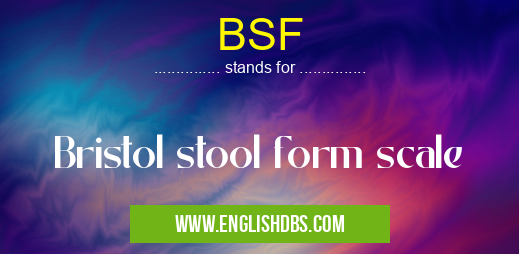What does BSF mean in GERIATRIC
Bristol Stool Form Scale (BSF), also known as the Bristol Stool Scale, is a medical tool used to classify the form and consistency of human feces, aiding in the diagnosis of various gastrointestinal conditions. It's a simple visual guide that assists healthcare professionals in assessing the patient's bowel movements and gastrointestinal function.

BSF meaning in Geriatric in Medical
BSF mostly used in an acronym Geriatric in Category Medical that means Bristol stool form scale
Shorthand: BSF,
Full Form: Bristol stool form scale
For more information of "Bristol stool form scale", see the section below.
What does BSF stand for?
BSF stands for Bristol Stool Form Scale.
BSF Classification
The BSF categorizes stool into seven distinct types, ranging from hard, dry stools to loose, watery stools:
- Type 1: Separate hard lumps, like nuts (hard to pass)
- Type 2: Sausage-shaped, but lumpy
- Type 3: Like a sausage but with cracks on its surface
- Type 4: Like a sausage or snake, smooth and soft
- Type 5: Soft blobs with clear-cut edges (passed easily)
- Type 6: Fluffy pieces with ragged edges, a mushy stool
- Type 7: Watery, no solid pieces, entirely liquid
Medical Significance
The BSF has significant medical implications:
- Assessment of Bowel Function: By classifying stool form, the BSF helps healthcare professionals evaluate a patient's bowel function and identify any potential digestive issues.
- Diagnosis of Gastrointestinal Disorders: Certain stool types are associated with specific gastrointestinal conditions, such as diarrhea (type 7) and constipation (type 1).
- Monitoring of Treatment Response: The BSF can be used to monitor the effectiveness of treatments for gastrointestinal conditions by tracking changes in stool form.
Essential Questions and Answers on Bristol stool form scale in "MEDICAL»GERIATRIC"
What is the Bristol Stool Form Scale (BSF)?
The BSF is a visual guide used by healthcare professionals to describe the form and consistency of human stools. It consists of seven categories, ranging from hard, separate lumps (Type 1) to watery, liquid stools with no solid pieces (Type 7).
Why is the BSF used?
The BSF helps healthcare professionals assess bowel health and identify potential digestive issues. It can provide insights into conditions such as constipation, diarrhea, and certain medical disorders that may affect bowel function.
How is the BSF used?
Patients are typically asked to visually compare their stools to the descriptions and images on the BSF chart. They then select the category that best matches their stool's form and consistency.
Are there any limitations to the BSF?
The BSF does not provide a complete diagnosis, and other tests or assessments may be necessary to determine the underlying cause of unusual stool forms. Additionally, certain medications or dietary changes can temporarily alter stool consistency.
How can I improve my stool form?
Maintaining a balanced diet, staying hydrated, and engaging in regular physical activity can contribute to healthy bowel function. In some cases, healthcare professionals may recommend dietary supplements or medications to improve stool form.
Final Words: The Bristol Stool Form Scale is a valuable tool for healthcare professionals to assess gastrointestinal function and diagnose gastrointestinal disorders. By providing a simple visual classification of stool form, the BSF facilitates accurate diagnosis and appropriate treatment.
BSF also stands for: |
|
| All stands for BSF |
